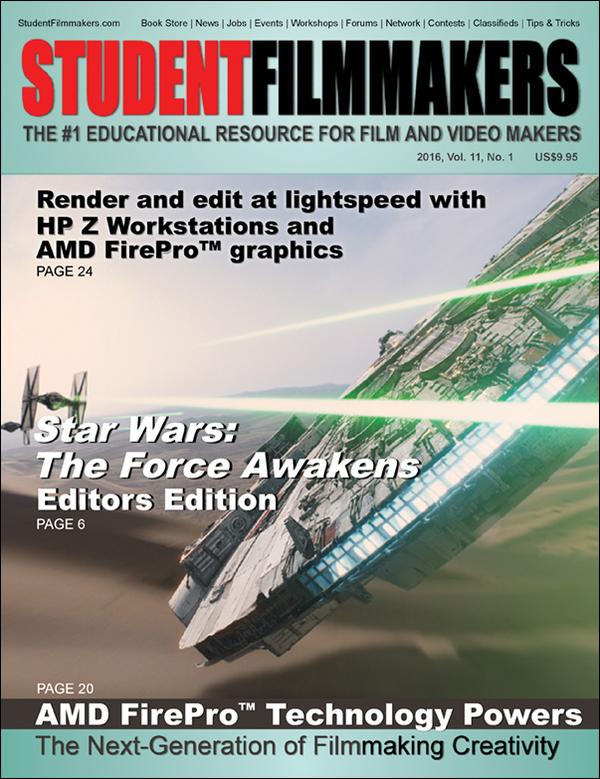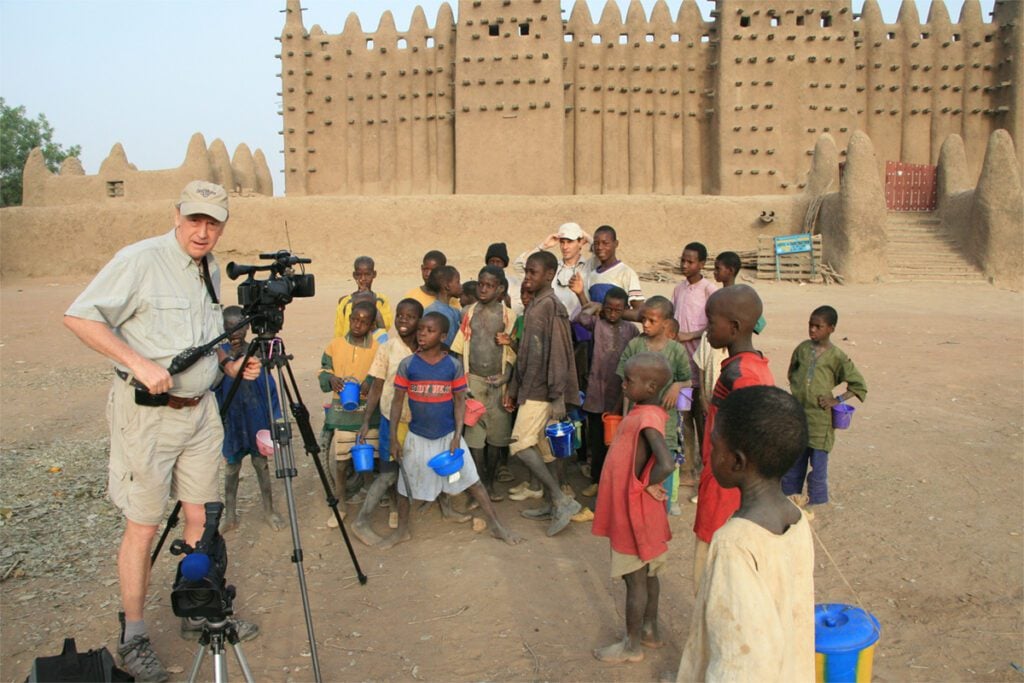by Carl Filoreto
It’s 7:15 in the morning, and in Tempe, Arizona, the speed dial is already active. Simultaneously, in four other locations spanning the nation, eager bureau chiefs are joining in the daily conference call to the mother ship in New York. Story ideas are pitched and dissected, resources are gathered and committed, and a working plan for the day morphs and evolves from the spirited conversation. Multi-tasking editors in Manhattan confirm the day’s story list, and agree to check on progress throughout the day. Everyone hits the ground running.
On the surface, it’s simply the daily ritual enacted by a number of national broadcast news organizations. In this instance, though, there’s one profound difference. That phone call from Tempe came from Emily Graham, a senior broadcast journalism major at Arizona State University’s Walter Cronkite School of Journalism and Mass Communication. And she’s calling the producers and editors at ABC News in New York as part of the ABC News On Campus newsgathering program.
The idea to establish working network news bureaus at college campuses across the country was spawned by John Green, executive producer of special project development at ABC News. “When I saw the recent wave of college graduates, it was so clear to me that they were creating journalism in a different way,” Green relates. “There was so much we could learn about the digital world they were living in, and about how they use digital tools.”
Green envisioned a perfectly balanced symbiotic model. News organizations around the globe are struggling to capture new audiences, and to retain their current ones. ABC News could tap into the creative energies percolating at college campuses across the country while providing a real life work environment for the students selected into the program. The students receive an invaluable experience to hone their editorial skills while the brain trust at ABC News have the opportunity to learn about how the incredibly valuable 20 to 24 year old demographic consumes news in today’s virtual marketplace. “It’s a throwback to the old mentoring programs established by newspapers in the 50’s and 60’s,” Green adds.
He advanced the idea to ABC News president David Westin, who enthusiastically endorsed the project. More importantly, he backed the concept with a modest budget and the idea was converted into a reality. Green and his team selected five universities that have highly rated journalism schools and set up a system of satellite news bureaus at the schools.
“Here, it’s an immersion program”, explains Susan Green, the faculty advisor for the program at Arizona State. “We intend to give the students the feel of working in a news room from 9 to 6, two or three days a week.” In fact, the entire process is handled in a manner that mimics real world practices. Students apply for one of five positions at each bureau. The resumes are pared down to a manageable number and those that advance go through a rigorous interview process. Of the five lucky candidates not voted off the island, one is picked to be the bureau chief. “This just is not a chance you get every day,” relates Emily Graham, bureau chief at ASU. “For me, ABC News was a powerful draw. I’m on the phone with the Los Angeles assignment desk every day. To have that type of access is amazing.”
The campus bureaus are usually attached to the newsrooms operating within each broadcast journalism school. ABC News provides the student journalists with small format cameras, computers and the software needed to perform a variety of multi-platform tasks, including video editing, writing mainstream web “print” type stories, blogging and uploading files to an FTP site. Although students are trained in both Final Cut Pro and Avid based editing systems, Avid is the work horse for the bureaus since it meshes with the editing platform at ABC News and many of their affiliated local stations.
“It’s a big learning experience for all of us,” explains Randy Wenner, instructor of broadcast journalism at Syracuse University’s S.I. Newhouse School of Public Communications. “The students have a tremendous opportunity to learn what it’s like to be affiliated with a broadcast news network. To watch them immerse themselves and thrive in a network culture, and to get their video and their stories in a newscast or online, is a thrill”. Torie Wells, a senior at Newhouse and the bureau chief in Syracuse, is excited about the range of opportunities offered by the program. “The producers in New York give us a lot of freedom to pitch stories. They’ll help us tailor the story to the right platform and then say go ahead,” she explains.
With opportunity comes responsibility, and the students quickly learn about the demands of uncompromising deadlines. While some of the their stories can be categorized as timeless evergreens that don’t come with a strict deadline attached to them, the students do occasionally find themselves caught in the whirlwind of a breaking national news story. The bureau at Newhouse provided assistance to ABC News during a plane crash in nearby Buffalo, and a deadly shooting rampage in Binghamton. “It’s getting used to moving and working quickly, as we would in a real newsroom,” Wells adds.
“We’ve stopped calling them student journalists,” a news director of the ABC affiliate in Phoenix says, “they’re simply journalists. They may not be totally polished, but we’ve only had good feedback about their work.” The Cronkite School supplies a daily regional news feed, aptly called the Cronkite News Service, and the ABC News On Campus journalists regularly post their work on it. When the news director chooses one of their stories and places it in a show rundown, it will be viewed in the twelfth largest television market in the country. In addition, the five participating bureaus place the bulk of their stories on the ABC News On Campus web site. And at times, the students see their video reach the lofty heights of the network’s flagship news programs like Nightline, Good Morning America, and World News Tonight. “I’m watching my video on ABC News London,” Emily Graham says with a touch of awe in her voice. “I never imagined I’d be working for a network while still going to college.”
The On Campus program had some pleasant surprises along the way to their first anniversary. “Sometimes we’re the instructors, telling the student journalists how to do it better,” John Green recounts, “and at other times we learn about content. We might think we know what twenty-five-year-olds want to see, but we don’t really. It’s an interesting hybrid.”
So while the producers and editors at the network file the rough edges and provide a layer of nuance to the skills of their prodigies, the unbridled enthusiasm and lack of bureaucratic cynicism expressed by the students can be refreshing. “I think they’re also learning from us,” Graham states enthusiastically. “We have newer and younger ideas, and we’re not afraid to take a risk in our story pitches.” Her mentor, Susan Green, concurs, “I think the folks at ABC News figured out it’s a blast working with students. It serves as a reaffirmation and re-energizes the career journalist, as well, so it works both ways.”
And in stark contrast to our times, the future looks very promising. “In these economic times, it would be so easy to cut a program like this, but David Westin hasn’t,” Green relates. “He’s pleased with the message and I like that. We’re investing in the future of the students.”
Carl Filoreto is an award-winning DP, and his company is Elk Run Productions, Inc., which has a roster of clients that spans corporations, production houses, crewing agencies, and broadcast and cable networks, including Dateline NBC, The Food Network, and The Travel Channel. Prior to starting his business, Carl won seven regional Emmy awards, numerous national and regional National Press Photographers awards, and multiple awards from Colorado Ski Country and the National Snowsports Journalists Association, while working at KMGH-TV in Denver, WTNH in New Haven, and WGGB in Springfield, Massachusetts.






One thought on “Creating Journalism in a New Way”
I loved this issue. We sent this issue to over 24,000 plus NAB bonus distribution! Great issue!